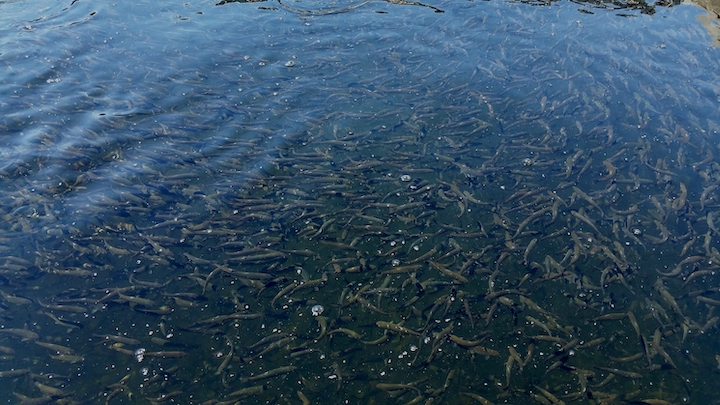
Puget Sound Tribes Want WFC Hatchery Lawsuit Dismissed
Five Western Washington tribes have filed paperwork in federal court to intervene in a Wild Fish Conservancy lawsuit targeting state hatchery salmon production in Puget Sound and the Lower Columbia.
With the suit seeking to halt WDFW programs rearing 23.6 million Chinook, coho and chums, Puyallup, Lummi, Squaxin Island, Nooksack and Tulalip officials last month asked US District Court Judge Jamal N. Whitehead in Seattle to join the case with the express purpose of filing motions to dismiss it.

Stopping production of mostly kings meant to help recover runs and increase prey for southern resident killer whales also “would directly prevent and imminently harm” their treaty fishing rights and “would be catastrophic to Puget Sound fisheries,” in the words of the Puyallup Tribe’s motion filed late last week.
The South Sound tribe additionally argues that WDFW “is not an adequate representative” of tribal interests in federal court given the history and other reasons, noting that the agency could take legal stands or agree to a settlement that are contrary to Puyallup needs.
This particular Wild Fish Conservancy lawsuit piggybacks on a 2021 one that went after WDFW’s new integrated summer-run broodstock program on the Skykomish River. This past February, a federal judge dismissed the steelhead portion because it was moot after the agency received the necessary federal paperwork, but allowed WFC to amend its complaint over production of 17.65 million spring and fall Chinook reared and released from the Nooksack, Samish and Deschutes Rivers and Minter, Chambers and Purdy Creeks hatcheries, as well as just under 6 million springers, fall coho and fall chum from facilities on the Lewis and Cowlitz Rivers.
The Duvall-based organization claims the programs “harm” and cause “take” to Endangered Species Act-listed salmon, steelhead and bull trout populations, and that that take “is not authorized or otherwise exempt from liability under section 9 of the ESA.”
That’s a fancy way to say WDFW’s aforementioned Chinook programs aren’t covered by the National Marine Fisheries Service in the form of a federally approved hatchery genetic management plan or other authorization. It’s a typical low-hanging-fruit WFC tactic around the large number of HGMPs that need to be written and/or signed off on by NMFS in the wake of all the ESA listings in the region, and was presaged by WDFW fall 2021 court filings acknowledging “the brutal reality” of the lag between listing and plan approval.
But it’s also another in a series of WFC lawsuits going after state and federal SRKW prey initiative production in recent years. The program is expected to have “shirttail” benefits for fishermen of all stripes.
In a declaration submitted to district court last month, Craig Bowhay of the Northwest Indian Fisheries Commission used fisheries modeling to project how the absence of those hatchery Chinook would affect management decisions.
“Impacts are significant and not just limited to hatchery fish or within the watersheds where these facilities are located but include regional impacts as well,” he wrote.
Bowhay noted that exploitation rates for natural-origin Nooksack, Stillaguamish, Snohomish, Nisqually and other stocks would rise, triggering treaty and nontreaty fishery reductions across the board – at sea and in those rivers.
The lawsuit would “unravel” efforts to increase orca forage and it “fails to address the potential impact to the ESA listed SRKWs,” Bowhay’s declaration adds. “The plaintiff’s requested curtailment of Chinook hatchery production totals 21,470,000 juveniles (3,820,000 from the Lower Columbia and 17,650,000 from Puget Sound). This completely negates the state and trial effort to benefit the health and wellbeing of the SRKWs and achieve an additional 20 million Chinook production increase NMFS recommended for a short-term risk reduction measure. This is a harm to both the SRKW and Tribes as SRKWs are a trust resource of strong cultural significance.”
And it would also “jeopardize” funding for hatchery construction work, according to another tribal declaration.
Earlier in April, the Tulalip and Nooksack Tribes also asked to intervene for the purposes of moving to dismiss the case, a request that was not fought by WFC, which requested they do so between June 5-20 “to allow the Conservancy and Defendants time to discuss whether a settlement can be reached before litigating the Motion to Dismiss.”
WDFW Director Kelly Susewind and all nine Fish and Wildlife Commission members are named in the suit. Whether it has anything to do with the case or not, they are scheduled to meet in executive session next week the day before oral arguments appear to be scheduled in federal court.
WFC is asking Judge Whitehead to declare WDFW officials in violation of ESA, issue an injunction requiring them to comply with the act, enjoin them from running and funding the programs until federal ESA coverage is given, and award them “reasonable litigation expenses.”

